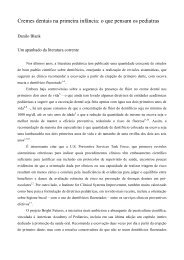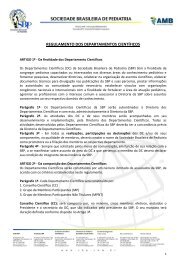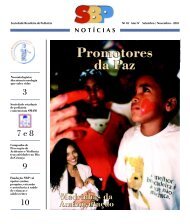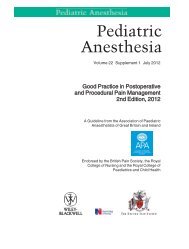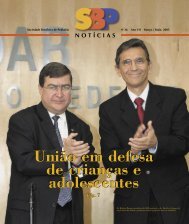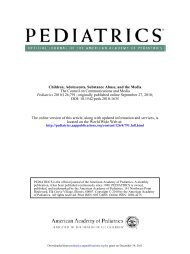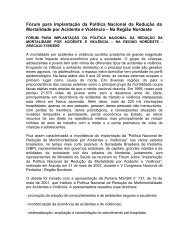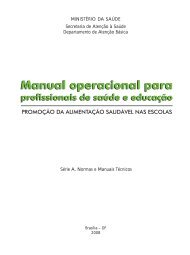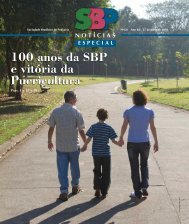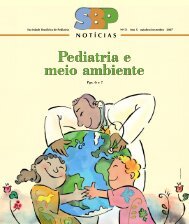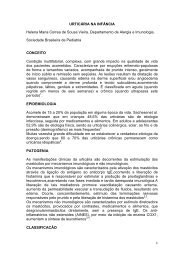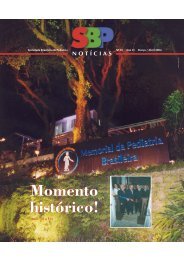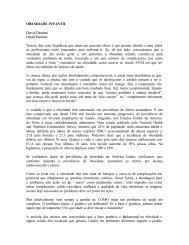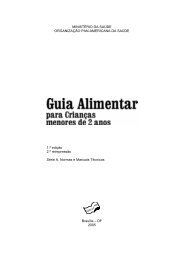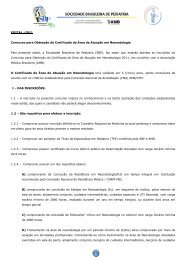The differential diagnosis of hypernatraemia in children, with ...
The differential diagnosis of hypernatraemia in children, with ...
The differential diagnosis of hypernatraemia in children, with ...
Create successful ePaper yourself
Turn your PDF publications into a flip-book with our unique Google optimized e-Paper software.
<strong>The</strong> Diagnosis <strong>of</strong> Salt Poison<strong>in</strong>g Lead<strong>in</strong>g to Hypematraemia <strong>in</strong> Children – September 2009<br />
7. Recommendations for further research<br />
Case reports<br />
This guidel<strong>in</strong>e has confirmed that case reports are crucial to an appreciation <strong>of</strong> the range <strong>of</strong><br />
causes for <strong>children</strong> present<strong>in</strong>g <strong>with</strong> <strong>hypernatraemia</strong>. As previously stated it is particularly<br />
difficult to undertake research <strong>in</strong>to child abuse, and the best available evidence will cont<strong>in</strong>ue<br />
to come from case reports.<br />
When the <strong>diagnosis</strong> is <strong>of</strong> non-accidental <strong>in</strong>jury, parental consent for publication is very<br />
unlikely to be obta<strong>in</strong>ed. A recently published letter 306 highlights the difficulties <strong>in</strong> gett<strong>in</strong>g<br />
case reports <strong>of</strong> factitious illness <strong>in</strong> <strong>children</strong> published <strong>in</strong> UK journals <strong>with</strong>out parental<br />
consent. <strong>The</strong> guidel<strong>in</strong>e group recommends that a mechanism for publish<strong>in</strong>g such case<br />
reports be established to avoid publication bias whilst ma<strong>in</strong>ta<strong>in</strong><strong>in</strong>g patient confidentiality.<br />
It is equally important to ensure publication <strong>of</strong> case reports concern<strong>in</strong>g <strong>children</strong> <strong>in</strong> whom<br />
the <strong>diagnosis</strong> <strong>of</strong> salt poison<strong>in</strong>g was seriously considered but excluded. In particular<br />
publication is crucial where otherwise healthy young <strong>children</strong> were shown to have<br />
voluntarily <strong>in</strong>gested sufficient salt to render them hypernatraemic.<br />
It is recommended that case reports should be prepared <strong>with</strong> sufficient detail to allow peer<br />
review as undertaken for this guidel<strong>in</strong>e.<br />
Normal values for fractional excretion <strong>of</strong> sodium<br />
Although some studies have already been undertaken from which normal values for the<br />
fractional excretion <strong>of</strong> sodium can be extrapolated <strong>in</strong> <strong>children</strong> <strong>of</strong> different ages, the numbers<br />
<strong>of</strong> subjects are still small, and further studies are recommended <strong>in</strong> normal <strong>children</strong>.<br />
Further studies <strong>of</strong> fractional excretion <strong>of</strong> sodium <strong>in</strong> <strong>children</strong> present<strong>in</strong>g <strong>with</strong> other causes<br />
<strong>of</strong> <strong>hypernatraemia</strong> <strong>in</strong>clud<strong>in</strong>g hypernatraemic dehydration are recommended.<br />
Studies <strong>of</strong> sodium excretion rates<br />
Further research <strong>in</strong>to sodium excretion rates <strong>in</strong> normal <strong>in</strong>fants and <strong>children</strong> and those <strong>with</strong><br />
other causes <strong>of</strong> <strong>hypernatraemia</strong> <strong>in</strong>clud<strong>in</strong>g hypernatraemic dehydration are recommended.<br />
87



